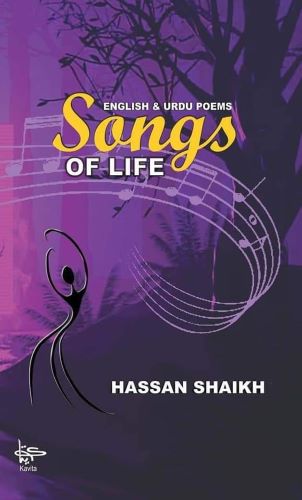
Whether you are a lover of poetry or simply seeking a source of inspiration, ‘Songs of Life’ is a must-read
Book Review by Muhammad Ibrahim Khokhar

“Songs of Life” is a mesmerizing collection of English and Urdu poems written by Professor Hassan Shaikh, a renowned poet and literary figure. This book offers a diverse range of themes, including romance, love, loss, beauty, humanism, and peace that explore the depths of human emotions and experiences.
The poems in this book are a testament to Professor Shaikh’s artistic talent and his ability to capture the essence of life’s most complex and beautiful moments. Through his vivid imagery and soulful verses, he takes the reader on a journey of self-discovery and reflection, exploring the complexities of the human heart and the beauty of the world around us.
Whether you are a lover of poetry or simply seeking a source of inspiration, ‘Songs of Life’ is a must-read. It presents a unique blend of English and Urdu poetry that transcends cultural and linguistic boundaries, and speaks to the universal human experience of love, loss, and longing.
Poetry is an art form that has the power to transport us to another world, to open our hearts and minds to new perspectives and experiences
Professor Shaikh’s lyrical voice and poetic mastery make ‘Songs of Life’ a timeless and captivating collection that is sure to leave a lasting impression on anyone who reads it.
“Poetry is an art form that has the power to transport us to another world, to open our hearts and minds to new perspectives and experiences. In his book Professor Hassan Shaikh invites us on a journey through the human experience, exploring the themes of romance, love, beauty, humanism, and peace through his beautiful English and Urdu poetry.
As a literary figure and accomplished poet, Mr. Hassan Shaikh has a unique ability to convey complex emotions through his verses, using language to evoke the subtleties of human experience. His poems are both introspective and universal, drawing on personal experiences to speak to the human condition in a way that is both relatable and deeply moving. He usually writes poems in Sindhi which deeply penetrates in the hearts of readers. His poems in Urdu and English also contain the same flow and power of imagination. Thus, for him language is simply a medium of expression. His expression is romantic and deeply imbued with mystic thought, love for letters and humanism.
Through his vivid imagery and powerful language, Prof Shaikh brings to life the beauty and wonder of the world around us
‘Songs of Life’ is based on English and Urdu poetry. English portion covers long and short poems, free verse and couplets while Urdu part consists of genres of ghazals and nazms. The first poem of English section is titled ‘A Poem to Peace’ whereas Urdu section begins with Hamad-e-Bari Tallah. Dr. Javed Manzar, a celebrated Urdu poet remarked “Though Urdu is not Hassan’s mother tongue yet he has in it composed artistic verses and compelled Urdu speakers to praise and appreciate his poetic glow. In this context, Chairman, Pakistan Academy of Prof. Dr. Yousuf Khushk asserts, Hassan’s poetry reflects romance, humanism, mysticism and love for land” while Prof. Dr. Ghulam Mustafa Mashori comments, “his poetry is appealingly simple, intensely lyrical and full of imagery” Moreover, Prof. Dr. Safeer Awan, himself a top-class English poet and ex-Pro-Rector NUML, Islamabad also appreciates fragrance of his literary thoughts and poetic flow.
Through his vivid imagery and powerful language, Prof Shaikh brings to life the beauty and wonder of the world around us, reminding us of the importance of finding beauty in the smallest moments of our lives. His poems offer a message of hope and peace, calling on us to embrace our shared humanity and strive for a better, more compassionate world.
‘Songs of Life’ is a truly exceptional collection of poetry that will leave a lasting impression on anyone who reads it. Prof. Shaikh’s mastery of language and ability to convey the complexities of the human experience make this book a must-read for anyone seeking to explore the depths of human emotion and find meaning in their own lives.
Personification is another literary device that Professor Shaikh uses to great effect in his poetry
Hassan Shaikh is known for his effective use of figurative language, including similes, metaphors, alliteration, and personification, among others. These literary devices add depth and richness to his poems, and help to create a vivid, sensory experience for the reader. One of the most common figurative devices used by the poet is metaphor, which he uses to draw comparisons between seemingly unrelated objects or concepts. Another technique applied by the poet is alliteration, which involves the repetition of initial consonant sounds.
Personification is another literary device that Professor Shaikh uses to great effect in his poetry. By giving human qualities to inanimate objects or abstract concepts, he is able to create a sense of empathy and connection between the reader and the subject of the poem. There are ample examples of personification, apostrophe and pun in his poems.
After reading his poetry we can assume that Prof Hassan Shaikh’s effective use of figurative language, including similes, metaphors, alliteration, and personification, is a hallmark of his poetic style. These literary devices add depth, richness, and sensory detail to his poetry, and help to create a powerful and emotional connection between the reader and the subject of the poem.
For the readers I would like to cite one of his free verses “Fountain of Tears”.
The day you left me in lurch,
My eyes became
Fountain of tears.
The poem is a reflection on the pain and sorrow of a broken relationship, as the speaker laments the departure of their loved one and the emotional toll it has taken on them. The title sets the tone for the poem, with the phrase “left me in lurch” suggesting a sense of betrayal or abandonment. The first line of the poem, “The day you left me in lurch,” is a clear indication of the event that has caused the speaker’s pain. The phrase “left me in lurch” implies that the speaker was left in a state of uncertainty or difficulty, without support or guidance. The second line, “My eyes became fountain of tears,” is a powerful use of metaphor that vividly conveys the speaker’s emotional turmoil. The comparison between the speaker’s tears and a fountain suggests a continuous flow of tears that is beyond their control, emphasizing the depth of their pain and loss. The poem’s brevity and simplicity add to its emotional impact, as the reader is left to imagine the details of the broken relationship and the speaker’s feelings of hurt and betrayal. The use of first person in the poem also creates a sense of intimacy and personal connection, drawing the reader into the speaker’s emotional experience.
Overall, “The Day you left me in lurch, My eyes became fountain of tears” is a poignant and powerful expression of the pain of lost love. The poem’s use of metaphor and first-person narration creates a strong emotional impact, inviting the reader to share in the speaker’s experience of loss and grief.
Another short and wonderful poem of Hassan Shaikh reads:
When you smile,
I forget a sea of sorrows
And feel benign breeze for a while.
The poem expresses the transformative power of a loved one’s smile in dispelling feelings of sorrow and pain. The opening line, “When you smile,” sets up the central image of the poem and establishes the condition necessary for the speaker’s emotional transformation. The second line, “I forget a sea of sorrows,” presents the speaker as burdened by a weight of sadness that is dispelled by the loved one’s smile. The hyperbole “sea of sorrows” conveys a sense of overwhelming emotional turmoil that the speaker is struggling to overcome. The third line, “And feel benign breeze for a while,” reinforces the idea of transformation, suggesting a shift from darkness to light, from sorrow to joy. The image of a “benign breeze” conveys a sense of gentle, refreshing relief that is experienced by the speaker in the wake of their loved one’s smile.
With all this poetic genius to his credit, Hassan Shaikh is an ideal teacher of English Literature
The brevity of the poem and the simplicity of its language contribute to its emotional impact, as the reader is drawn into the speaker’s experience of transformation and renewal. The use of first-person narration creates a sense of intimacy and personal connection between the reader and the speaker. Overall, “When you smile, I forget a sea of sorrows and feel benign breeze for a while” is a powerful expression of the transformative power of love. The poem’s use of metaphor and first-person narration creates a strong emotional impact, inviting the reader to share in the speaker’s experience of joy and relief.
His Urdu section is also of greater importance which illustrates his minute observation, poetic sensibilities and richness of literary style.
لوگ جدائی کے صدمے میں دنیا سے چل بستے ہیں
تیری جدائی تیرے حَسن کی چاہت اور بڑھاتی ہے
Prof Hassan indicates that usually the pangs of separation cause people to die instantly as they miserably fail to encounter it, but for him the torture of long separation develops more love for his beloved. He doesn’t display any note of pessimism here instead weaves power of optimism.
ریشمی سپنے
اگر بنت حوا
جوبن کی حسین بہاروں کے طلسماتی گرم موسم میں
ریشمی سپنوں کی کھوج میں
خود کو پرفریب لذتوں سے
اپنا کردار شیشے کی طرح صاف رکھے
تو وہ اپنی نازک کوکھ سے
ہزاروں قلندر جنم دے سکتی ہے۔
The above free verse is a clear guideline for young emotional females who for the sake of love enjoy the lust of physical world of their blooming youth and face stress. The poet imparts a concept of suggestiveness that these girls if protect their lap from the dirt of physical corruption and secure themselves from the stains of detrimental environment around them they are liable to give birth to towering heroes to bring about revolutions.
With all this poetic genius to his credit, Hassan Shaikh is an ideal teacher of English Literature. He attracts his students with his knowledge of literature and use of poetic devices in his class. He is my colleague at Shah Abdul Latif Universityy, Khairpur, Sindh and my senior in academics. These days he is pursuing a PhD in English Literature from the University of Sindh. His book of Sindhi poetry Nainan Ji Moseeki (Music of Eyes) in the process of publication. I wish him everlasting success and more achievements to his academic and literary career.
Songs of Life
Published by: Kavita Publication, Hyderabad 2023
ISBN: 978-969-717-056-2
Pages: 128
__________
 Muhammad Ibrahim Khokhar is a PhD Scholar of NUML Islamabad, and Assistant Professor, Institute of English, Shah Abdul Latif University Khairpur Sindh
Muhammad Ibrahim Khokhar is a PhD Scholar of NUML Islamabad, and Assistant Professor, Institute of English, Shah Abdul Latif University Khairpur Sindh